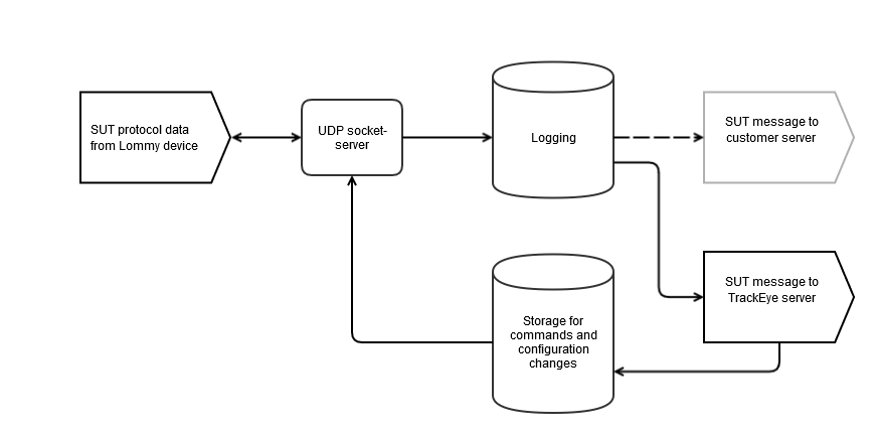[/customer server]

With the standard software, it is possible to configure all Lommy models to communicate directly with a customer server, to exchange data, commands and configurations.
SUT protocol
The following Lommy models are communicating over UDP, using the SUT protocol:
- 9L2, 9L6, 9L8 Lommy Eye
- 9L16 Lommy Capture
- 9L23 Lommy Power
A detailed description of the SUT protocol can be found in the document Flextrack Mini Tracker, page 18.
additional information can be found in the document Flextrack SUT Protocol.
SUT forward/split solution
For an easier customer implementation, another possibility is to use the SUT forward/split solution.
With this solution the Flextrack servers are responsible for answering the units correctly. Furthermore, the Flextrack support staff will be able to help with configuration changes and administration.
The SUT forward/split system is a UDP-receiver [1], receiving data from Lommy devices, using the SUT (Secure-UDP-Transport) protocol [2], logging the messages, and forward the data to one (forward) or two (split) destination servers.
For performance reasons the forwarder will not handle replies from the destination servers directly, as this can slow down the whole chain. If one of the destination servers is a TrackEye server, commands and parameter changes to be delivered to the device, will be queued and delivered on the next transmission from device. The configurations and commands can be queued using the TrackEye / Lommy Fleet systems or API.

[1] https://en.wikipedia.org/wiki/User_Datagram_Protocol
[2] http://cdn.appserver.dk/files/FlextrackSUTProtocol.pdf
FlexCl protocol
The following models are communicating over TCP/IP, using the FlexCl protocol:
- 7L2, 17L2 Lommy Pro
A detailed description of the FlexCl protocol can be found in the document Flextrack Standard Tracker, page 83
For communication with 3. Party equipment, special user apps are installed, which in most cases sends additional data to the server (e.g. temperature data from reefer units). This kind of data is called generic data and are send mainly over UDP.



